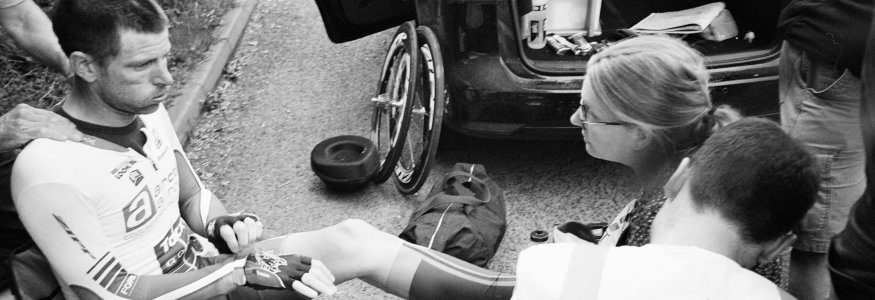
It’s 5pm Friday and I’m stood at the top of Bridge Valley Road in Bristol. I’m going to be bundled into the back of a moving van then hurled out somewhere north of the border whilst they stalk a man on a bike for two days at about 20mph.
This is because Michael Broadwith is attempting to break the End to End, Land’s End to John O’Groats record. Current incumbent Gethin Butler clocked 44 hours, 4 minutes and 19 seconds in 2001. Recent attempts have dissolved into puddles of sweat and angst, typically somewhere just north of Preston.
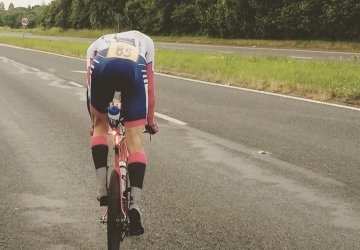 Four support vehicles play an elaborate game of leapfrog. The Arctic SRAM van is crammed with bikes, tyres, wheels, equipment, a larder of bike food and four hardened men. Pete Ruffhead is the team leader and sponsor and Steve Nunn from Barnet his wingman. Tim Bayley sits in front of a spaghetti of wires and screens.
Four support vehicles play an elaborate game of leapfrog. The Arctic SRAM van is crammed with bikes, tyres, wheels, equipment, a larder of bike food and four hardened men. Pete Ruffhead is the team leader and sponsor and Steve Nunn from Barnet his wingman. Tim Bayley sits in front of a spaghetti of wires and screens.
Tim knows what it is like to ride along the precipice of oblivion. John Williams also knows. He is observing for the Road Records Association (RRA) and organises the Mersey Roads 24hr. But no-one knows more about long dark years of the soul than Steve Abrahams, who finished his year with 72,000 miles on the clock; further than I’ve driven in ten years.
Car two contains legendary stopwatch wielder John Pick. Riding shotgun is the serene Bridget Boon. She is amongst the strongest 24 hour riders ever. Rob Pitto and Jez Constable are on point.
In car three sits team leader Helen Simpson, wife of Michael, mother of eight month old Poppy. I find it hard taking our kids to the park at the end of the road, let alone taking them to the park 840 miles away in Scotland. Ian Boon observes in the same car. Together the Boons have got a competition record for something demented on a tandem which no-one dares try and take from them.
Dave Hill and Richard Taylor are helping. There is also a psychedelic campervan with signs that give notice that this van is doing special things. It contains Mike’s uncle and aunt, Chris and Jane Brooks and an illuminated sign saying ‘Mike’.
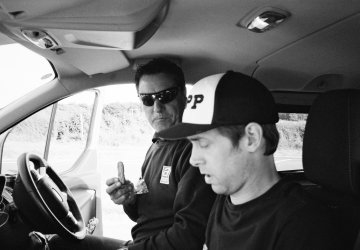 These are the people mad enough to drive to Scotland at 20mph with no sleep. This is the dream team, zooming through Cornwall.
These are the people mad enough to drive to Scotland at 20mph with no sleep. This is the dream team, zooming through Cornwall.
Everyone is happy. Cornish towns disappear beneath the hum of tubulars and swoosh of the disc wheel. Locals peer nervously at the curious iron horse hurtling through Okehampton. The brown stuff hits the whirly thing near Bridgwater. Bicycles are 20mph faster than cars when the road is a constipated mess. Mike is on his own, without food or water.
Anxiety permeates each key stroke on the WhatsApp group: I volunteer to do a hand-up in Bristol. Then I realise my bottles are disgusting; I spot some Sea Monkeys circulating in the one I left on my bike. I smashed through my last three gels earlier in the week when I bonked massively on a 15 mile ride home from work. I run out the door to buy some. My bag sits against my back and I can feel the sweat congealing like mozzarella on a cold pizza. I just make it. Mike appears over the crest. He sees me and grabs the hand-up. He says, ‘Cheers Paul’.
I haven’t screwed it up. I will be allowed in the van.
The van is hectic. There is stuff and wires everywhere. The following cars converge. Mike is a hypotenuse heading northwards to the beat of a 220 watt drum. Steve Nunn wants a Cornish pasty, but it is 200 miles too late. Steve Abraham is traumatised from an experience with some Cornish cheese.
We pass through 259 miles in twelve hours, hurtling slowly through the leaden flood plain, the line graph of the Malv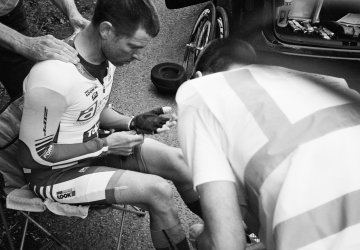 ern Hills drawn with a ruler against the half-light. A policeman flashes the lights: it’s ok; he’s a big fan and has been dot-watching in the custody suite. A clubman plays the bugle at the side of the road. A short stop is called by Helen; cold soup from the tin, and not gazpacho. Mike whispers conspiratorially to Helen: “This event is ridiculous.” How do you reply? Rhetorical questions about what bears get up to in the woods spring to mind.
ern Hills drawn with a ruler against the half-light. A policeman flashes the lights: it’s ok; he’s a big fan and has been dot-watching in the custody suite. A clubman plays the bugle at the side of the road. A short stop is called by Helen; cold soup from the tin, and not gazpacho. Mike whispers conspiratorially to Helen: “This event is ridiculous.” How do you reply? Rhetorical questions about what bears get up to in the woods spring to mind.
We press on towards Kidderminster where revellers look up from kebabs in alcoholic confusion at the slippery sight. The van stops at Wolverhampton. I smash through my burger. John Williams throws his chips on the floor and we leave them for the locals. We are living the dream. Steve Abraham eats more cheese. Steve Nunn wants a Cornish pasty. There is the seductive promise of stronger winds, but also rain. We head out again and get as close as we can, headlights on full beam, illuminating the road. Mike is tapping it out at 21mph.
The Garmin stops working. We swap it. The new one doesn’t work. The chain unships so we swap in another Garmin and the syncopated stutter ends. We are off again, but it’s less fluid and the undulations have increased.
Stafford arrives and people cheer. The rhythm returns. The roadside presence provokes goosebumps, with whole families out to support before hurtling up the road to cheer again. People in different colour jerseys indicate the shift in district. Mike is stitching together the club colours in a thread of social history, a colourful line connecting us all in a common endeavour. Meanwhile, in the van we worry about the gilet, it’s bunched up. Marginal gains. The overshoes are a hit though; “they’re like luminous Ugg boots” says Steve Nunn. The other Steve tells a cycling story about an abscess which cannot be repeated.
And onwards through the post-industrial northern corridor of Preston and Carnforth. Dawn carefully negotiates with n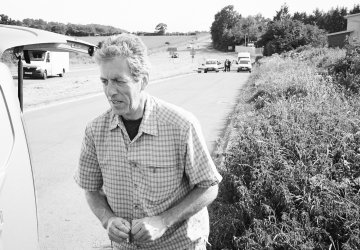 ight and the darkest indigo pulses swirl outwards in fractals of ink. A figure in a yellow Preston Wheelers jacket is cheering. Gethin Butler is here in fellowship. The wind picks up and flutters the feather flags of garages, drawing a fist-pump from Mike. A thumbs-up at the county marker for Cumbria, a smile. He is 40 minutes up.
ight and the darkest indigo pulses swirl outwards in fractals of ink. A figure in a yellow Preston Wheelers jacket is cheering. Gethin Butler is here in fellowship. The wind picks up and flutters the feather flags of garages, drawing a fist-pump from Mike. A thumbs-up at the county marker for Cumbria, a smile. He is 40 minutes up.
The Lakeland hills loom with Shap Fell a silent shadow under a somnolent and slate grey sky. Shap is the reckoner, John Williams says it has done for many illustrious riders. A shake of the weather and the incline is enough to unsettle the legs and heart. Mike’s front light pierces through the fog of the summit, he is untroubled. Twenty seconds is enough for a layer and snack. Mike clocks Gethin. “Thank you so much...” he says.
The border beckons, and with it, the 24 hour record. The rain arrives in solid streams. Six miles are required in 14 minutes. A sprint prime. Coordinates are taken, a mark painted: provisionally an incredible 507.8 miles. Rivulets of rain arc up from the back wheel. The climbs loom like whales under the tarmac, floating up to the surface and raising the incline into enormous humpbacks of hardship. They roll and break and flumes of spray cascade down. The temperature refuses to improve but Mike pulses remorselessly onwards, now 45 minutes up on schedule. We feel good but dare not voice it.
And then the cold seeps through, ameliorated briefly by a stop for hot food. The helpers are drenched and time is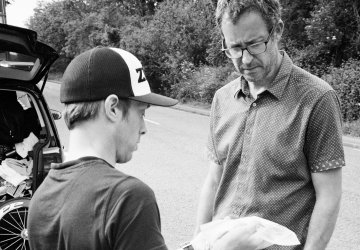 slipping, back to 30 minutes up at Kelty, the pernicious fingers of cold pick-pocketing seconds and minutes. Mike is struggling. His neck hurts - it could be Shermer’s syndrome where neck muscles go beyond fatigue and refuse to help. By 1.43pm heat pads, paracetamol and ibuprofen are ready. The ride is in the balance. Optimism evaporates like heat shimmer over an arid lake bed of depression and fear. The stretch through to Perth is a purgatory and the sleep-addled support team struggle to keep things on track as the average speed plummets. Mike is broken, the record attempt is slipping through his fingers and we know it. It is over. Helen gets ready to pull the plug. Mike wants respite; he gets a bike change.
slipping, back to 30 minutes up at Kelty, the pernicious fingers of cold pick-pocketing seconds and minutes. Mike is struggling. His neck hurts - it could be Shermer’s syndrome where neck muscles go beyond fatigue and refuse to help. By 1.43pm heat pads, paracetamol and ibuprofen are ready. The ride is in the balance. Optimism evaporates like heat shimmer over an arid lake bed of depression and fear. The stretch through to Perth is a purgatory and the sleep-addled support team struggle to keep things on track as the average speed plummets. Mike is broken, the record attempt is slipping through his fingers and we know it. It is over. Helen gets ready to pull the plug. Mike wants respite; he gets a bike change.
People watching refresh the tracker, hoping for more. How do you judge the moment? You know it is going to be dark, but just how dark it can get is impossible to process. Mike props up his head with an elbow on the armrest. Helen tells him to do it for 20 minutes. Then another 20 minutes. He does this for 200 miles.
A flatter bit delays the decision. There surely can’t be any more water left in the spiteful Scottish sky. The schedule is down, now only 12 minutes up, but time is haemorrhaging. A message floats across the group; “it is now only theoretically possible”, deflating any vestiges of hope.
Tim tries the hospital in desperation for a neck brace but they can’t help unless he books in. Mike’s neck might be collapsing in on itself but now is not the time to test hospital waiting times. We need fortitude and hope. Lynne Taylor provides it, calling in contacts and finding someone with a neck brace. The 1,526 feet of Drumochter Pass goes on forever; time slips away down the mountain and spirits ebb with every lost second. We know what’s coming: more horrible climbs, undulating coast roads and the effects of sleep deprivation. Previous holder Andy Wilkinson lost his way, forgetting he was even on a record ride. Ralph Dadswell had no idea whether he was coming or going; “Someone got my Dad on the phone... I wasn’t even sure it was him”. All this lies ahead.
We wait for Helen to make the call. We support and help. “He is begging me not to make him go on because he feels unsafe. I believe in him so much but he can’t hold his own head.”
And we cry.
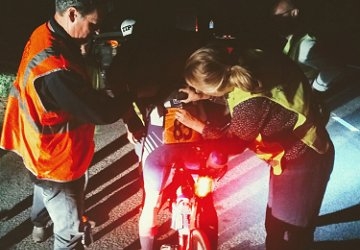 Over Drumochter, finally, and there are nine miles of descent until Aviemore. It seems so close, but it’s a long way to the finish 145 miles away. Mike resorts again to the “Rodin’s Thinker” position and makes it safely down. A full stop is planned at the Black Isle, a chance to regroup and assess. Helen remembers holidaying in Inverness with Mike. She has a plan. Mike loved Inverness. He knows it is riding distance to the finish. There is soup, porridge, a complete kit change. Everyone sets out to sell the deal.
Over Drumochter, finally, and there are nine miles of descent until Aviemore. It seems so close, but it’s a long way to the finish 145 miles away. Mike resorts again to the “Rodin’s Thinker” position and makes it safely down. A full stop is planned at the Black Isle, a chance to regroup and assess. Helen remembers holidaying in Inverness with Mike. She has a plan. Mike loved Inverness. He knows it is riding distance to the finish. There is soup, porridge, a complete kit change. Everyone sets out to sell the deal.
The gloom lifts slightly, the van is warm, the kit is nice, the food replenishes and the stop is like a “Formula 1 team but better” says Helen. But the fear and anxiety of everything that went before remains.
Mike jettisons the neck brace - he can’t breathe. Faced with a choice of breathing or holding his neck, he chooses the latter. Suddenly, a minute has been clawed back. It feels significant. Tired minds struggle to reconcile the figures, but we agree it leaves the small matter of a six hour hundred needed for the record. We’ll ignore the 37 hour 740 that went before. It might be possible. People are staying awake. The internet is going bananas. GO MIKE!
He can’t look up, he is exhausted, but he thinks he can do it. Now is not the time for regrets; this is the moment on which the ride turns. Mike knows he can tap it out. He knows it is on. Somehow he ekes out time, stealing it from the monstrous hands of fatigue and pain. He gives a thumbs-up at Invergordon. No-one knows how he is still going. He has Helmsdale, Berridale and the coast road to go.
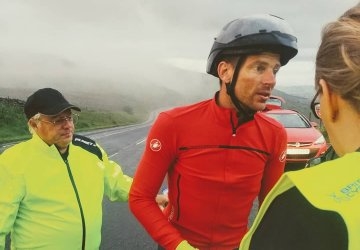 The late night revellers of Helmsdale are intrigued: “What... since 8am on Friday? But it’s Sunday. I don’t get it. 43 hours??” They are thrilled and excited by the incomprehensible. ‘GO MIKE!’ they shout. He rips up the climb. He is relatively heavy and relatively fast and hits the climb of Berridale next, his interior monologue is working, just not his neck. Later on he recalls his thoughts: “I thought, bloody hell, this is me, in this moment, and I’m climbing up Berridale and I’m going to nail this record. I have to remember it because it is a perfect moment in life where I’m actually living the moment that I wanted to live in incredible intensity.”
The late night revellers of Helmsdale are intrigued: “What... since 8am on Friday? But it’s Sunday. I don’t get it. 43 hours??” They are thrilled and excited by the incomprehensible. ‘GO MIKE!’ they shout. He rips up the climb. He is relatively heavy and relatively fast and hits the climb of Berridale next, his interior monologue is working, just not his neck. Later on he recalls his thoughts: “I thought, bloody hell, this is me, in this moment, and I’m climbing up Berridale and I’m going to nail this record. I have to remember it because it is a perfect moment in life where I’m actually living the moment that I wanted to live in incredible intensity.”
And we all feel it, but we don’t express it at the time or later. We are living a moment in time with perfect intensity and something special is happening and we are all a part of it. This is what days are for; days are where we live. Only the coast remains; “climb after climb after bloody climb,” says Mike. Steve Abraham stands at the side of the road, he runs alongside:
“You can do this Mike, you got this Mike, you’ve got it, you can do it...”
And we realise absolutely he’s going to do it. It is a feat beyond the imagination, a triumph of strength and determination, of support and fellowship. Everyone moves forwards to take up position in John o’ Groats. Mike rolls in as low-key fireworks explode gently. John Pick does his second job of the trip; pressing the stop button, some 43 hours, 25 minutes 13 seconds after he pressed the start button.
It’s 4 O’Clock in the morning. People are shattered. Pete Ruffhead grins, broadly, tears are never far away. Helen holds Poppy. No-one knows how or what to do, how to move, where to stand, what to say, they share a look, an 840-mile stare. Mike is propped against the car door, eating food. Tentative plans are made for a celebration later. Mike wonders where people are going, what they are doing. No-one really knows.
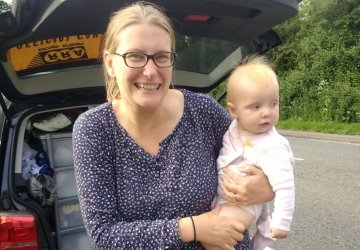 “Well done Mike. Get some sleep”, says Ian.
“Well done Mike. Get some sleep”, says Ian.
“What are you doing now?” asks Mike.
“Er. I dunno. What can you do in John O’ Groats?” says Ian.
The Team
The Bike: Michael Broadwith, number 85.
The Touran: Helen Simpson, Poppy Broadwith, Dave Hill, Richard Taylor, Ian Boon (observer).
The Arctic Van: Steve Nunn, Pete Ruffhead, Steve Abraham, Tim Bayley, Paul Jones, Jon Williams (observer).
The Camper: Chris and Jane Brooks (Aunt and Uncle).
The TK Chariot: John Pick (timekeeper), Bridget Boon (observer), Rob Pitt, Jez Constable.
